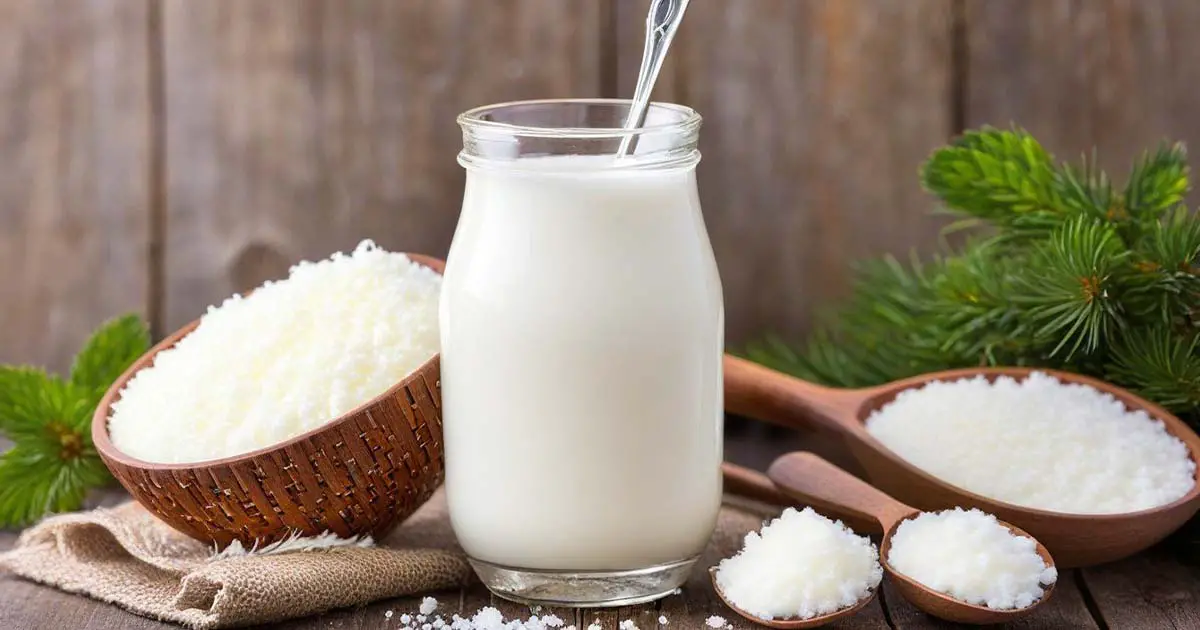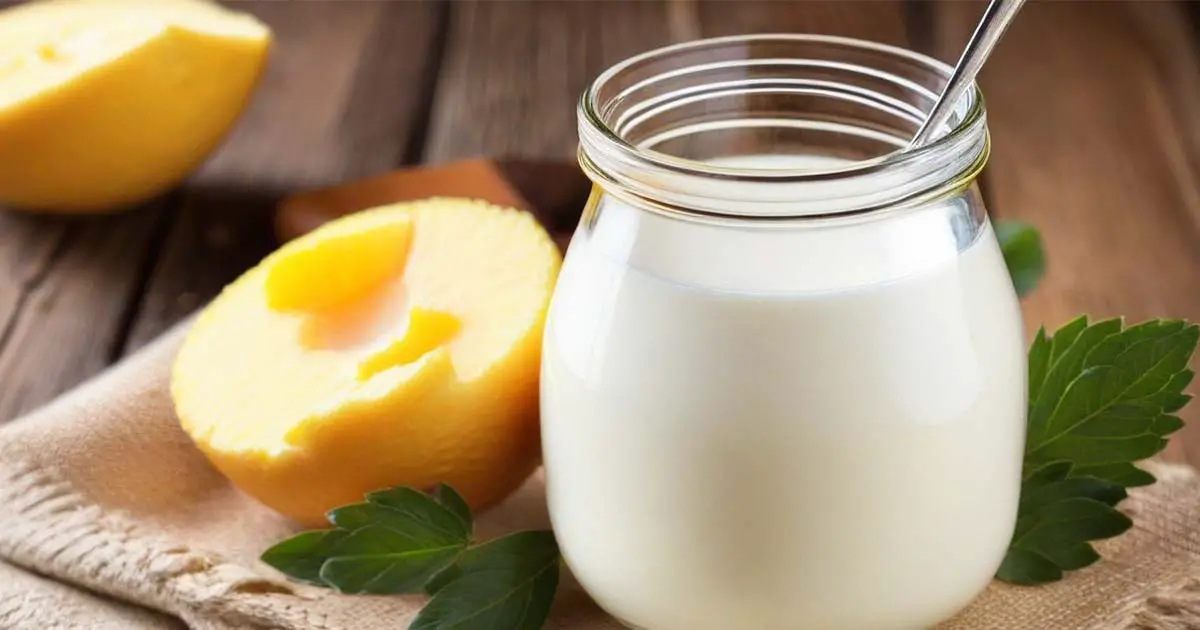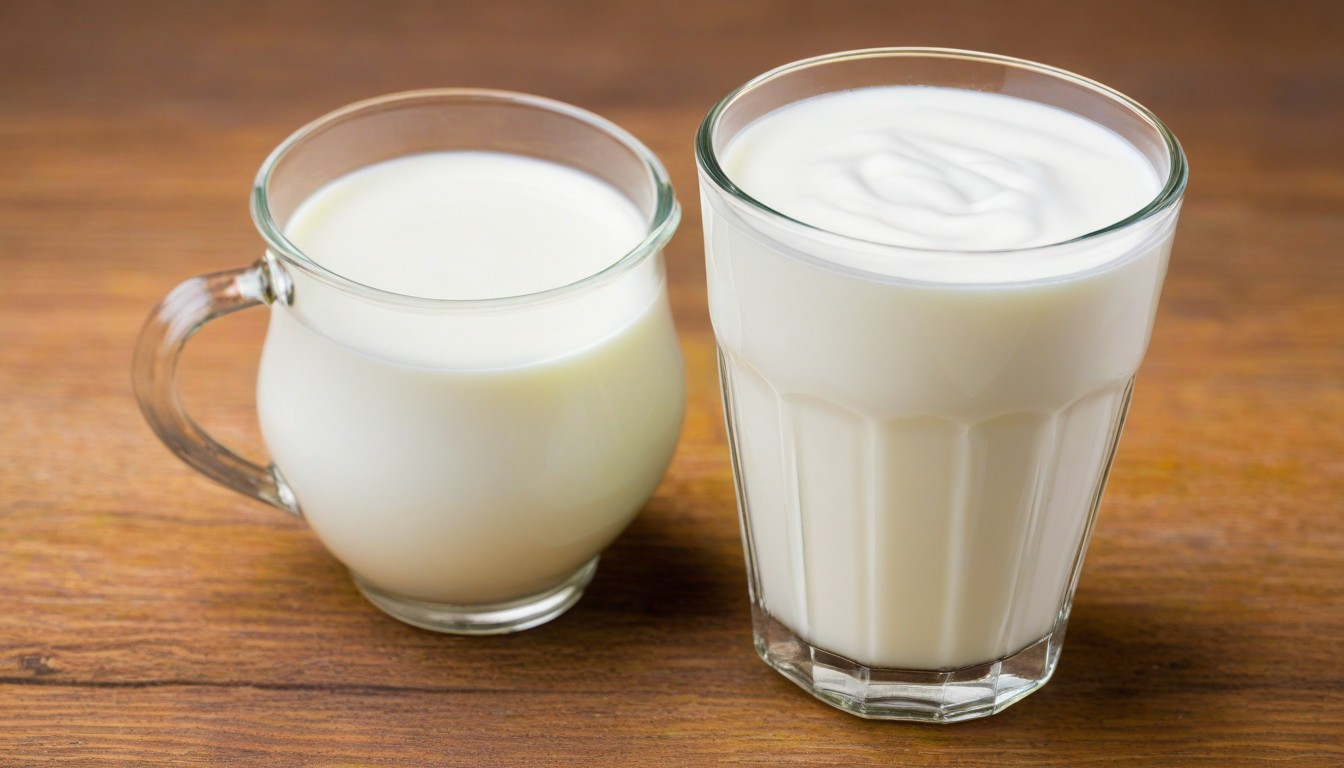Coffee enthusiasts are always on the lookout for new and innovative ways to enhance their daily cup of joe. In recent times, the combination of coffee and probiotic-rich kefir has been gaining popularity. But, the question remains – can you put kefir in coffee? Let’s delve into this intriguing fusion of flavors and explore the potential benefits it may offer.
Table of Contents
ToggleWhat is Kefir?

Kefir is a fermented milk drink that originated in the Caucasus region. It is made by adding kefir grains to milk, which are composed of bacteria and yeast cultures. These microorganisms ferment the sugars in the milk, turning it into a tangy, effervescent beverage with a texture similar to thin yogurt.
The fermentation process in kefir results in the production of various beneficial compounds, including probiotics, which are live bacteria that can have positive effects on digestive health. Kefir is often praised for its potential to promote a healthy balance of gut bacteria.
Kefir can be made from various types of milk, such as cow’s milk, goat’s milk, or even non-dairy alternatives like coconut milk. It is a versatile ingredient that can be enjoyed on its own or used in smoothies, salad dressings, or other culinary applications. The taste of kefir is slightly tangy and may vary depending on the type of milk used and the fermentation process.
What should you not mix with kefir?

While kefir is a versatile and healthy beverage, there are certain things you might want to avoid mixing with kefir to preserve its nutritional benefits and flavor. Here are some things to be cautious about:
- Hot or Boiling Liquids: Avoid mixing kefir with very hot or boiling liquids, as high temperatures can kill the beneficial bacteria in kefir. If you want to use kefir in a warm dish, it’s better to add it after the dish has cooled slightly.
- Highly Acidic Foods: Kefir is already slightly acidic due to the fermentation process. Avoid combining it with extremely acidic foods or beverages as it may lead to an overly tangy or sour taste. Examples of highly acidic foods include citrus fruits and vinegar.
- Very Sweet Foods: While a moderate amount of sweetness is acceptable, extremely sweet foods or drinks might overpower the natural tanginess of kefir. If you’re using kefir in a smoothie, be mindful of the sugar content of the other ingredients.
- Excessive Amounts of Sugar: Adding excessive amounts of sugar to kefir may counteract its potential health benefits. If you prefer a sweeter taste, consider using natural sweeteners like honey or maple syrup in moderation.
- Highly Salty Foods: Mixing kefir with very salty foods might not be palatable for some people. It’s best to moderate the salt content when using kefir in savory dishes.
- Protein-Rich Foods with Enzymes: Certain enzymes found in some fruits (like pineapple and papaya) can interact with proteins and potentially affect the texture of kefir. If you are using kefir in a dish that contains these fruits, it’s advisable to consume it promptly to avoid undesired changes.
It’s important to note that individual preferences vary, and these suggestions are general guidelines. Experimenting with different combinations can help you discover what works best for your taste preferences and dietary needs.
Does heat destroy kefir?
Yes, heat can potentially impact kefir by affecting the live cultures present in the beverage. Kefir is a fermented product, and the beneficial bacteria and yeast responsible for fermentation are sensitive to high temperatures. Exposing kefir to heat, especially temperatures significantly above room temperature can lead to a reduction in the number of live cultures or even the death of these microorganisms.
The live cultures in kefir are what make it a probiotic-rich food, providing potential health benefits for digestion and gut health. If kefir is subjected to high heat, such as boiling or near-boiling temperatures, it can kill the live cultures and diminish its probiotic properties.
To preserve the probiotic benefits of kefir, it’s best to avoid exposing it to excessive heat. When using kefir in recipes or incorporating it into hot dishes, it’s advisable to add it towards the end of the cooking process or after the dish has cooled slightly to minimize the impact of heat on the live cultures.
Is kefir hard on the liver?
Generally, kefir is not considered hard on the liver. In fact, kefir is often regarded as a health-promoting beverage due to its probiotic content and potential benefits for gut health. The live cultures in kefir are strains of bacteria and yeast that can contribute to a healthy balance of microorganisms in the digestive system.
However, individual responses to foods can vary, and some people may experience sensitivities or reactions to certain components in kefir. If someone has a specific liver condition or concerns about their liver health, it’s advisable for them to consult with a healthcare professional for personalized advice.
In moderation, for most people, kefir is a nutritious and probiotic-rich addition to a balanced diet. It’s important to consider overall dietary habits and lifestyle factors when evaluating the impact of any food on health, including liver health. If you have specific health concerns or conditions, seeking guidance from a healthcare provider is always recommended.
How long does it take for kefir to heal your gut?
The timeline for experiencing the potential gut-healing benefits of kefir can vary widely from person to person. Factors such as the individual’s overall health, the specific condition of their gut, and their diet all play a role. Additionally, scientific studies on the precise time it takes for kefir or other probiotics to have a noticeable impact on gut health are limited.
It’s essential to understand that the benefits of consuming kefir for gut health are generally a result of its probiotic content. Probiotics are beneficial microorganisms that may help maintain or restore a healthy balance of bacteria in the digestive system. This balance is crucial for proper digestion, nutrient absorption, and overall gut function.
Some people may notice improvements in their gut health relatively quickly after incorporating kefir into their diet, while others may take longer to experience changes. It’s recommended to consume kefir regularly as part of a balanced diet, rather than expecting immediate results. Consistency is key when it comes to supporting gut health with probiotics.
When should I drink kefir at night or morning?

The best time to drink kefir can depend on your personal preferences and lifestyle. Both morning and night can be suitable times to consume kefir, and the choice may depend on your routine and how your body responds. Here are some considerations for both options:
Morning:
- Kickstart the Day: Some people prefer to start their day with a nutritious beverage. Drinking kefir in the morning can provide a dose of probiotics and nutrients to kickstart your day.
- Digestive Wake-Up: Consuming kefir in the morning may coincide with your body’s natural digestive rhythms, potentially enhancing its positive effects on gut health.
Night:
- Digestive Aid: Consuming kefir at night may help support digestion before bedtime. The probiotics in kefir can work during the night to promote a healthy balance of gut bacteria.
- Relaxation Routine: For individuals who find a calming routine before bedtime beneficial, a glass of kefir can be part of a relaxing evening ritual.
General Tips:
- Consistency is Key: The most important factor is to be consistent in your kefir consumption. Whether morning or night, regular intake can contribute to the potential health benefits.
- Consider Personal Tolerance: Some people might find that their digestive system responds better to kefir at a specific time of day. Pay attention to how your body feels after consuming kefir and adjust accordingly.
Ultimately, there is no strict rule about when to drink kefir. It’s a matter of personal preference and what fits well into your daily routine. Whether you choose morning or night, incorporating kefir into your diet can be a positive step towards supporting gut health.
Does kefir flatten your stomach?
There is no direct evidence to suggest that kefir specifically flattens the stomach. However, kefir can be part of a healthy diet that supports overall digestive health, and a healthy digestive system is associated with a flatter stomach for some individuals.
Here are a few ways in which kefir might indirectly contribute to a flatter stomach:
- Probiotics and Gut Health: Kefir is rich in probiotics, which are beneficial bacteria that can promote a healthy balance of microorganisms in the gut. A balanced gut microbiota is associated with improved digestion and may reduce symptoms of bloating or discomfort, contributing to a flatter stomach for some people.
- Reducing Bloating: Some individuals experience bloating due to an imbalance of bacteria in the gut or other digestive issues. The probiotics in kefir may help regulate the digestive system and reduce bloating in those cases.
- Nutrient Absorption: A healthy gut is essential for optimal nutrient absorption. By promoting gut health, kefir may contribute to improved absorption of nutrients, supporting overall health and potentially impacting body composition.
It’s important to note that individual responses to dietary changes can vary, and while some people may experience benefits from including kefir in their diet, others may not see the same results. Achieving a flatter stomach also involves other factors such as a balanced diet, regular physical activity, and overall healthy lifestyle choices.
If you have specific concerns about digestive health or bloating, it’s advisable to consult with a healthcare professional. They can provide personalized advice based on your individual health status and help determine the best approach for you.
Is kefir OK in coffee?

Yes, you can add kefir to coffee if you enjoy the combination. It’s a matter of personal preference, and some people find that the tangy flavor of kefir complements coffee. Here are a few tips if you decide to try it:
- Temperature Consideration: Avoid adding kefir to very hot or boiling coffee, as high temperatures can potentially harm the live cultures in kefir. Let your coffee cool slightly before mixing in kefir.
- Stir Well: To ensure that the kefir blends smoothly with the coffee, stir well after adding it. You can use a spoon or a small whisk to mix the two together.
- Experiment with Ratios: The ratio of coffee to kefir is a matter of personal taste. Start with a small amount of kefir and adjust based on your preferences. Some people prefer a subtle hint of kefir flavor, while others may enjoy a more prominent presence.
- Sweeteners: Depending on your taste preferences, you might want to experiment with sweeteners. Some people find that a touch of honey or a natural sweetener complements the combination.
Remember that kefir is a fermented dairy product with a tangy taste, so the flavor profile may be different from what you’re used to in traditional coffee creamers or milk. As with any new addition to your diet, it’s a good idea to observe how your body reacts and adjust based on your individual preferences and tolerance.
How do you make coffee with kefir?
Making coffee with kefir is a simple process, and you can customize it to suit your taste preferences. Here’s a basic guide on how to make coffee with kefir:
Ingredients:
- Freshly brewed coffee
- Kefir
Instructions:
- Brew Coffee:
- Brew your coffee using your preferred method. This could be a drip coffee maker, French press, pour-over, or any other method you prefer.
- Cool Coffee Slightly:
- Allow the coffee to cool slightly before adding kefir. Adding kefir to extremely hot coffee can potentially harm the live cultures in the kefir.
- Pour Coffee:
- Pour the brewed coffee into your mug or cup.
- Add Kefir:
- Add kefir to the coffee. Start with a small amount, and you can adjust according to your taste preferences.
- Stir Well:
- Use a spoon or a small whisk to stir the kefir into the coffee thoroughly. This ensures that the kefir is well-mixed and integrated with the coffee.
- Optional Additions:
- If desired, you can sweeten your coffee with honey, maple syrup, or any other sweetener of your choice. You can also experiment with adding spices like cinnamon or nutmeg for additional flavor.
- Serve and Enjoy:
- Your coffee with kefir is ready to be served. Enjoy the unique flavor and potential health benefits of this combination.
Remember that the flavor of kefir in coffee can be different from traditional dairy creamers or milk, so it’s a good idea to start with a small amount of kefir and adjust according to your taste preferences. Additionally, feel free to experiment with different types of kefir (such as plain or flavored) to find the combination you like best.
Can you put kefir in cold coffee?
Yes, you can put kefir in cold coffee. Cold coffee, whether it’s iced coffee or cold brew, provides a refreshing alternative to hot coffee, and kefir can be a great addition to enhance both the flavor and nutritional profile.
Here’s how you can incorporate kefir into your cold coffee:
- Brew or Prepare Cold Coffee:
- Brew a pot of coffee and let it cool to room temperature or prepare cold brew coffee by steeping coarsely ground coffee in cold water for an extended period (usually 12-24 hours).
- Choose Your Kefir:
- Select the type of kefir you prefer. You can use plain kefir or experiment with flavored kefir, depending on your taste preferences.
- Add Kefir to Coffee:
- Once your cold coffee is ready, pour it into a glass over ice if desired.
- Add kefir to the coffee. The ratio can be adjusted based on your taste preferences.
- Stir Well:
- Stir the mixture well to ensure that the kefir is evenly distributed throughout the cold coffee.
- Optional Additions:
- If you like, you can sweeten your cold coffee with honey, syrup, or any preferred sweetener. Consider adding flavorings such as vanilla or spices for additional taste.
- Serve and Enjoy:
- Your cold coffee with kefir is ready to be enjoyed. It’s a refreshing and potentially probiotic-rich beverage.
Adding kefir to cold coffee is a versatile way to incorporate probiotics into your diet while enjoying a cool and flavorful drink. Feel free to experiment with different coffee-to-kefir ratios and other optional additions to find the combination that suits your taste buds best.
Conclusion:
In the realm of coffee innovations, the marriage of coffee and kefir is a noteworthy trend that offers both flavor and potential health benefits. Wondering, “Can you put kefir in coffee?” If you’re seeking a unique twist to your morning ritual, don’t hesitate to experiment with this question. Adding kefir to your coffee is a simple yet effective way to elevate your cup of joe and potentially support your gut health simultaneously. Cheers to the joy of experimentation and the endless possibilities in the world of coffee!


